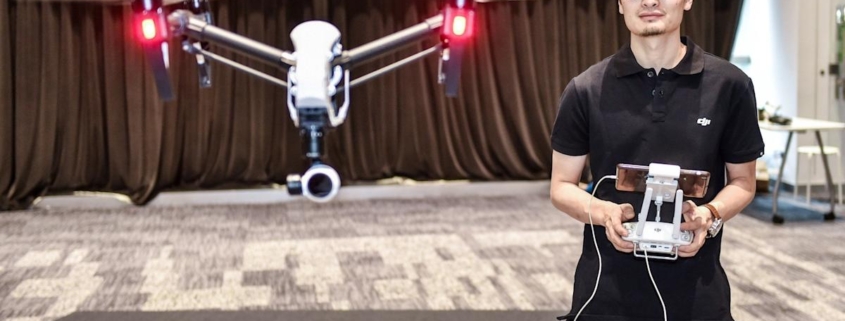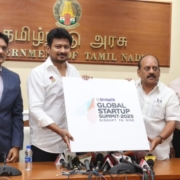the new breed of entrepreneurs reshaping the global tech landscape
A new generation of Chinese entrepreneurs, represented by a group of start-up founders known as the “Fantastic Four”, are reshaping the global technology landscape and helping China in its rivalry with the US.
Liang Wenfeng, founder of Hangzhou-based artificial intelligence (AI) start-up DeepSeek, along with Wang Xingxing, Zhang Yiming and Wang Tao, the founders of Unitree Robotics, ByteDance and DJI, respectively, are being hailed for their role in transforming China into a formidable tech power.
DeepSeek’s Liang and Unitree’s Wang were among a group of local business entrepreneurs invited to a high-profile symposium chaired by President Xi Jinping last month. Wang, the youngest entrepreneur at the meeting at just 35 years old, told Xi that the humanoid robot developer and its team were “born and raised in China”.
Do you have questions about the biggest topics and trends from around the world? Get the answers with SCMP Knowledge, our new platform of curated content with explainers, FAQs, analyses and infographics brought to you by our award-winning team.
Xi responded that the country’s innovation required contributions from a younger generation, according to a report from the official Communist Party newspaper People’s Daily.
Unlike the former generation of Chinese tech entrepreneurs who grew up with memories of absolute poverty – such as Alibaba Group Holding‘s Jack Ma, Baidu‘s Robin Li Yanhong and Tencent Holdings‘ Pony Ma Huateng – China’s new generation of tech tsars were born after the country began its “reform and opening up” phase under Deng Xiaoping, when “class struggle” was abolished and private enterprise was encouraged. Alibaba owns the South China Morning Post.
Unitree’s Wang was born in 1990, while Zhang was born in 1983. Liang’s birth year was 1985, and DJI’s Wang was born in 1980. They grew up in a period remembered as the most liberal and open-minded since the founding of the People’s Republic of China, during which traditional social barriers were dismantled and science, engineering and maths education proliferated across the country’s public school system.
Their upbringing also largely coincided with an era of accelerated globalisation, in which Western influence left its mark on Chinese society. Before Liang created DeepSeek in 2023, he operated the hedge fund High-Flyer Quant, which was inspired by the US quant hedge fund manager Jim Simons. In one of the few published articles by Liang, he wrote a preface for the Chinese translation of The Man Who Solved the Market, the biography of the US investor.
A key factor in the success of the four entrepreneurs is their experience in securing resources and surviving China’s highly competitive marketplace. Compared with their Silicon Valley peers, they have been shaped by a local upbringing that fostered competitiveness in a brutal market environment, which in turn enabled them to launch groundbreaking tech products with global impact, according to analysts and business professors.
Winston Ma, adjunct professor at New York University with a focus on the global AI digital economy, said Chinese founders were good at taking existing technologies – often invented in the West – and rapidly testing and scaling them in the Chinese market with an attention to detail that enhanced the user experience and minimised the cost of delivery.
“If not, you will become history,” Ma said.
Many of them have already become billionaires. ByteDance’s Zhang is one of the richest people in China. Their wealth is set to grow further, as ByteDance, DJI, DeepSeek and Unitree have yet to make initial public offerings. They all built up their businesses in China’s state-led economy from humble beginnings and with little state support.
DeepSeek, initially a side project at Liang’s quant trading business, sent shock waves across Silicon Valley and Wall Street in late January after its low-cost, high-performance R1 and V3 large language models (LLMs) impressed the world.

Wang Tao, founder of DJI. Photo: Xinhua alt=Wang Tao, founder of DJI. Photo: Xinhua>
DJI, the world’s top drone maker, started out in Wang Tao’s dorm room, while Zhang’s ByteDance, which owns TikTok, one of the most popular apps in the world, had its beginnings in a Beijing residential flat in 2012.
Wang Xingxing created Unitree in 2016, and he struggled to raise funds in the early days. The equity structure of Unitree is very fragmented, with Wang holding 33 per cent.
Guo Bai, assistant professor of strategy and entrepreneurship at the China Europe International Business School, said the new generation of Chinese entrepreneurs represented by the Fantastic Four were able to succeed globally because of their domestic focus.
“The Chinese market nowadays is one of the most demanding and competitive in the world,” Guo said, adding that exposure to the domestic market is an advantage when it comes to the competitiveness of a firm.
Travis Kalanick, founder and ex-CEO of Uber Technologies – the ride-hailing firm that entered the Chinese market early on, only to cede its China operations to Beijing-based Didi Chuxing – said that back then Chinese tech companies were “copying” at a breakneck speed, and that strategy eventually led to innovation and the ability to out-compete some US firms.
Kalanick, speaking on a podcast in January, described Chinese ride-hailing competition between 2014 and 2016 as an “all-out war”, explaining that as local firms grew sharper and faster at replicating, they eventually ran out of things to copy, “and then it flips to creativity and innovation”.

Zhang Yiming, founder of ByteDance. Photo: Chinatopix via AP alt=Zhang Yiming, founder of ByteDance. Photo: Chinatopix via AP>
China’s Fantastic Four have demonstrated innovation at a time when the country’s tech companies have met growing scrutiny from US politicians and even members of the public amid an intensifying rivalry with the US. TikTok has been at the eye of the storm, while AI is a critical area seen by both Beijing and Washington as a way to build up tech dominance.
Brock Silvers, chief investment officer at Kaiyuan Capital in Hong Kong, said that although Chinese tech entrepreneurs were “doing their utmost” to support Beijing’s global ambitions, the country’s tech development was still likely to be significantly impacted by geopolitical factors.
“Self-sufficiency may be achievable, but global adoption and leadership still largely depend on coming developments in an increasingly troubled Sino-US relationship,” Silvers said.
The success of the Fantastic Four has thrust the entrepreneurs into the nationalistic spotlight. Liang was hailed as a national hero after DeepSeek’s models showed how Chinese companies could still develop innovative products despite US tech restrictions, while the folk dance performed by Unitree robots during China’s widely watched Spring Festival Gala showed 1 billion Chinese viewers how the start-up has turned from a follower to a challenger of Elon Musk’s Optimus, a general-purpose humanoid robot.
The four tech titans have been grouped together partly because none were educated in a foreign country. DJI’s Wang studied at the Hong Kong University of Science and Technology, ByteDance’s Zhang studied at Nankai University in Tianjin, while Liang attended Zhejiang University in Hangzhou.
As for the Unitree founder, the most widely reported anecdote about his education was his “poor” English. Despite being a top science student, Wang struggled with English, and his low scores in the subject – a requirement for postgraduate study – landed him at Shanghai University instead of a top school.
However, Unitree’s influence from outside China is evident. The company’s first product, Laikago, was named after Laika, the first dog to orbit the Earth as part of the early Russian space programme. In a 2017 interview, Wang also said he was inspired by Boston Dynamics, the US robotics company founded in 1992 when it spun out of the Massachusetts Institute of Technology.

Wang Xingxing, founder of Unitree, poses with one of the company’s robots in January 2025. Photo: Handout alt=Wang Xingxing, founder of Unitree, poses with one of the company’s robots in January 2025. Photo: Handout>
ByteDance’s Zhang was inspired by a trip to Silicon Valley in 2014, where he visited US tech giants such as Facebook, Google and Airbnb. He also tried Tesla‘s latest electric vehicle at the time. After returning to China, Zhang, then 31, wrote in a blog post that “the golden era of China’s technology companies is arriving”.
Unlike Millennial US tech entrepreneurs such as Meta Platforms’ Mark Zuckerberg and OpenAI’s Sam Altman, the new generation of Chinese entrepreneurs have preferred to keep themselves out of the spotlight and to avoid making public comments or appearances. ByteDance’s Zhang and DJI’s Wang have not accepted any interviews or shown up to public events for years despite the growing influence of their business empires.
DeepSeek’s Liang was so media-shy that he has not made any comments about his firm’s business in recent weeks, even as its tech grabbed headlines at home and abroad. It marked a sharp contrast to his US peers such as OpenAI founder Sam Altman, who has been globe-trotting to meet fans and investors.
They are also reluctant celebrities with no track record of “showing off wealth” – a characteristic that separates them from Chinese tycoons in finance and property. Zhang has reportedly focused on reading AI papers and courting top industry talent, while Liang has kept himself involved in research in search of new breakthroughs.
Jeffrey Towson, founder of TechMoat Consulting, which advises companies on digital strategies, said Chinese entrepreneurs could definitely compete in global markets like Latin America and Europe if they could survive in hyper-competitive China.
“If US business is like soccer, then Chinese business is rugby,” he said. “They are used to playing a rougher sport.”
This article originally appeared in the South China Morning Post (SCMP), the most authoritative voice reporting on China and Asia for more than a century. For more SCMP stories, please explore the SCMP app or visit the SCMP’s Facebook and Twitter pages. Copyright © 2025 South China Morning Post Publishers Ltd. All rights reserved.
Copyright (c) 2025. South China Morning Post Publishers Ltd. All rights reserved.











